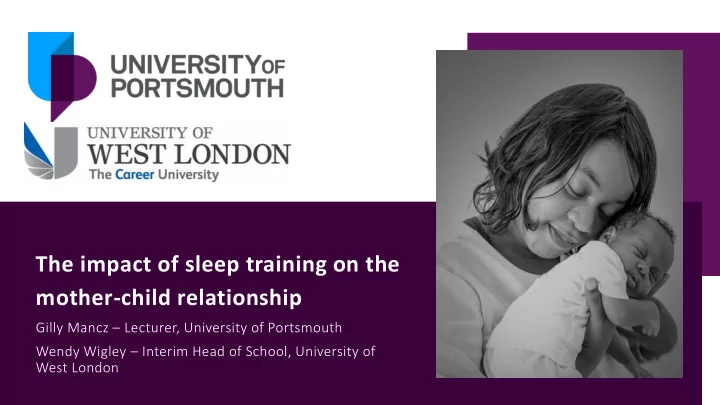

The impact of sleep training on the mother-child relationship Gilly Mancz – Lecturer, University of Portsmouth Wendy Wigley – Interim Head of School, University of West London
Sleep disturbance in early childhood – frequency and impact • Behavioural insomnia is the most common sleep disturbance in the under-fives age group [1] • Associated with negative outcomes for both the child and their family [2,3][4-6] • Interventions such as controlled crying and gradual retreat are the recommended treatment [1,6]
Neuroscience and behavioural interventions - contention in the literature • Interventions • Controlled crying • Gradual retreat • Extinction • Contention • Techniques that ignoring a child’s distress may cause damage to infant mental health and the parent-child bond [8-10].
Behavioral interventions and infant stress response • Middlemiss et al (2012) [11] found infants’ physiological response remained heightened after behavioural cues resolved • Findings not replicated in two further studies [12-13] • No differences found between controlled crying, gradual retreat or control group five years post intervention [12] • RCT found no distinction in cortisol levels or mother-child attachment between children in modified extinction groups or control group [13]
Behavioral interventions and maternal mental health • Low maternal mood is associated with poor infant sleep • Maternal mood was found to improve in groups offered behavioural interventions compared to control groups in two RCT studies [14-15] • Prioritising support for managing sleep disturbance could also reduce incidence of postnatal depression
Recommendations for practice • The current evidence is that behavioural techniques are not associated with harm to • infant mental health • parent-child attachment • and can improve maternal mental health, • Practitioners working with parents of infants with sleep disturbances can confidently recommend • controlled crying • gradual retreat
References • [1] Hill, C. (2011) Practitioner Review: Effective treatment of behavioural insomnia in children. Journal of Child Psychology and Psychiatry 52 (7): 731 – 741 • [2] Holley, S., Hill, CM., & Stevenson, J. (2011) An hour less sleep is a risk factor for childhood conduct problems. Child Care Health Dev 37 (4): 563- 570 • [3] Taveras, E., Rifas-Shiman, S., Oken, E., Gunderson, E., & Gillman, M. (2008) Short Sleep Duration in Infancy and Risk of Childhood Overweight. Archives of Paediatric and Adolescent Medicine 162(4):305-311 • [4] Hiscock, H., & Wake, M. (2002) Randomised controlled trial of behavioural infant sleep intervention to improve infant sleep and maternal mood. BMJ 324: 1062 • [5] Smart, J., & Hiscock, H. (2007) Early infant crying and sleeping problems: A pilot study of impact on parental well-being and parent-endorsed strategies for management. Journal of Paediatrics and Child Health 43 (1-2): 284-290 • [6] Črnčec , R., Matthey, S., & Nemeth, D. (2009) Infant sleep problems and emotional health: a review of two behavioural approaches. Journal of Reproductive and Infant Psychology 28 (1): 44-54 • [7] Moturi, S., & Avis, K. (2010) Assessment and Treatment of Common Pediatric Sleep Disorders. Psychiatry 7 (6): 24-37 • [8] Gerhardt, S. (2004) why love matters: how affection shapes a baby’s brain. East Sussex: Routledge
References • [9] Blunden, S., Thompson, KR., & Dawson, D. (2011) Behavioural sleep treatments and night time crying in infants: challenging the status quo. Sleep Medicine Reviews . 15 (5): 327-34 • [10] Australian Association for Infant Mental Health Inc (2013) Controlled Crying – Position Paper 1 . Available at: https://www.aaimhi.org/key- issues/position-statements-and-guidelines/AAIMHI-Position-paper-1-Controlled-crying.pdf[Accessed 23.8.18] • [11] Middlemiss, W., Granger, D., Goldberg, W., & Nathans, L. (2012) Asynchrony of mother-infant hypothalamic-pituitary-adrenal axis activity following extinction of infant crying responses induced during the transition to sleep. Early Human Development 88(4):227-232 • [12] Price, A., Wake, M., Ukoumunne, O., & Hiscock, H. (2012) Five-Year Follow-up of Harms and Benefits of Behavioural Infant Sleep Intervention: Randomized Trial. Pediatrics 130 (4):643-51 • [13] Gradisar, M., Jackson, K., Spurrier, N., Gibson, J., Whitman, J., Williams, A., Dolby, R., & Kennaway, D. (2016) Behavioural Interventions for Infant Sleep Problems: A Randomized Controlled Trial. Pediatrics . 137 (6):e20151486 • [14] Hiscock, H., Bayer, J., Hampton, A., Ukoumunne, O., & Wake, M. (2008) Long-term Mother and Child Mental Health Effects of a Population-Based Infant Sleep Intervention: Cluster-Randomized, Controlled Trial. Pediatrics 122 (3): e621-627 • [15] Hall, W., Hutton, E., Brant, R., Collet, J., Gregg, K., Saunders, R., Ipsiroglu, O., Gafni, A., Triolet, K., Tse, L., Bhagat, R., & Wooldridge, J. (2015) A randomized controlled trial of an intervention for infants’ behavioural sleep problems. BMC Pediatrics . 15:181
Questions
Recommend
More recommend